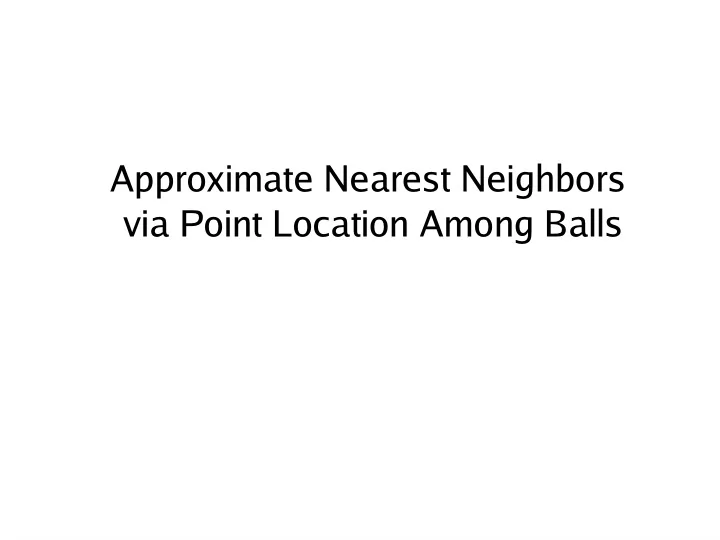

Approximate Nearest Neighbors via Point Location Among Balls
Method of Har-Peled (improved version from notes) Reduce -ANN query on n points to point 1 location in equal balls (PLEB) queries O n log t n − Preprocessing space O log n − Preprocessing time O log n − Query time
Notation d P q Distance from point q to nearest neighbor point in set P U balls P ,r Union of balls of radius r about points in P NNbr P,r “Nearest Neighbor” data structure U balls P ,r Returns TRUE and a witness point if query point q is in and FALSE otherwise I P ,r , R , “Interval Nearest Neighbor” data structure for points in set P, over range [r, R], with approximation error d P q Indicates if is outside range [r, R] or returns the ball centered 1 at the point -ANN to q
Reduction from ANN to PLEBs Build a tree D − Each node v has an interval NNbr data structure I v − Use to decide how to traverse the tree when I v search reaches node v
Constructing D Given set P of n points in metric space M
Constructing D Find the ball radius r such that has U balls P ,r connected components ⌈ n / 2 ⌉ r = 0 Connected Components: 8
Constructing D Find the value of r such that has U balls P ,r ⌈ n / 2 ⌉ connected components r = 0.25 Connected Components: 8
Constructing D Find the value of r such that has U balls P ,r ⌈ n / 2 ⌉ connected components r = 0.5 Connected Components: 6
Constructing D Find the value of r such that has U balls P ,r ⌈ n / 2 ⌉ connected components r = 0.65 Connected Components: 4
Constructing D Recursively build a sub tree for each connected component and add as child of root node v v
Outer Child Choose one representative from each connected component to be in set Q v
Outer Child Recursively build a tree over points in Q and hang it on on node v This child of v is the “ o uter child” v
Constructing D Build the interval NNbr data structure for node v I v = I P ,r ,R , / 4 point set search range [r, R] approximation error R = 2 c nr / Let c Where & are parameters that will be defined later...
Answering a query using D Given query point q, use to decide between I v three cases v
Answering a query using D Case 1: − returns and search terminates 1 ANN I v v
Answering a query using D Case 2: d P q ≤ r v − Recurse into child corresponding to connected component containing q v
Answering a query using D Case 3: d P q R v − Recurse into outer child v
algorithm terminates If at step i we consider a set of size n i then at step i+1 we consider a set of size n i 1 ≤ n i / 2 1 Thus search halts after number of steps steps ≤ log 3 / 2 n
Algorithm is correct Same result as target ball query on all constructed balls Approximation error − From node v to a connected component child No approximation error − From node v to the “outer child”: 1 / c − From the interval NNbr search: 1 / 4
Approximation error log 3 / 2 n t ≤ 1 1 ∏ c 4 i = 1 log 3 / 2 n c ≤ exp ∏ set =⌈ log 3 / 2 n ⌉ c and large enough so that... c 4 i = 1 log 3 / 2 n ≤ exp ∑ c 4 i = 1 ≤ exp 2 ≤ 1 1 Thus result of a query on d is -ANN to query point q
Query time As search proceeds down tree D − at most two NNbr queries are performed at a node and we traverse O(log n) nodes − at last node the data structure performs I v O log log n /= O log n NNbr queries O log n − Query time is
Efficient Construction Construction space/time is currently O n 2 Use HST of P to t-approximate metric M Use correspondence between subtrees in HST and connected components to find the ball radius r that gives connected components ⌈ n / 2 ⌉ Results in construction space/time O n log t n
What have we done? Reduced an ANN query to multiple NNbr queries But NNbr queries seem hard to solve efficiently − Solution: Use deformed “approximate balls” − Same bounds hold for the extension to “approximate balls”
Questions
Recommend
More recommend